Select Language
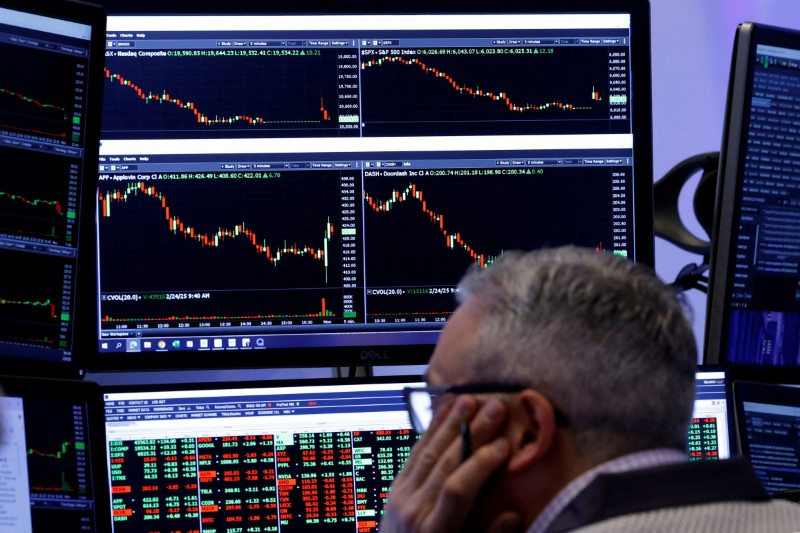
U.S. stock futures widened losses early Wednesday after reciprocal tariffs announced by President Donald Trump took effect, intensifying a global trade war and heightening fears of a global recession.
S&P 500 Futures dropped 2.7% to 4,885.0 points, while Nasdaq 100 Futures also slumped 2.7% to 16,781.50 points by 01:57 ET (05:57 GMT). Dow Jones Futures slid 2.4% to 36,965.0 points.
Trump’s tariffs take effect, including 104% on China
President Donald Trump’s sweeping reciprocal tariffs officially took effect at midnight Wednesday, marking a dramatic escalation in global trade tensions. The most significant measure includes a 104% cumulative tariff on Chinese imports—a combination of prior duties and a new 50% hike announced on Tuesday.
The move follows China’s retaliatory 34% tariffs and has effectively reignited a trade war between the world’s two largest economies.
Other notable tariffs included a 20% duty on the European Union, 24% on Japan, 46% on Vietnam, 25% on South Korea, and 32% on Taiwan.
The tariffs are part of a broader U.S. trade strategy that imposes steep levies on countries deemed to have unfair trade advantages.
The policy shift has rattled global markets, sparked retaliatory tariffs from key U.S. trade partners, and raised fears of a broader economic downturn.
Goldman Sachs analysts said the global recession risks were still not fully priced in by markets, despite an ongoing sell-off seen after April 2, signaling further declines ahead.
The S&P 500 closed 1.6% lower at 4,982.77 on Tuesday, marking its first close below the 5,000 threshold in nearly a year.

By Naveen Thukral
SINGAPORE (Reuters) - Oil prices fell to a four-year low on Wednesday in its worst five-day losing streak in three years, while several commodities, including base metals, tumbled as the trade war between China and the U.S. is set to intensify.
Stocks in Asia extended a slide on Wall Street as U.S. President Donald Trump looked set to press ahead with whopping 104% duties on Chinese goods as global recession fears gripped financial markets.
"Crude oil extended losses amid signs of escalation in the trade war," ANZ said in a note. "Copper has lost nearly 10% since Trump announced his reciprocal tariffs on major trading partners."
The United States said on Tuesday that the higher tariffs on imports from China will take effect shortly after midnight, even as the Trump administration moved to quickly start talks with other trading partners targeted by sweeping tariffs.
Oil prices dropped to their lowest in more than four years on looming demand concerns fuelled by the tariffs war between the U.S. and China, the world’s two biggest economies, and a rising supply outlook.
"China’s aggressive retaliation diminishes the chances of a quick deal between the world’s two biggest economies, triggering mounting fears of economic recession across the globe," said Ye Lin, vice president of oil commodity markets at Rystad Energy.
China’s expected oil demand growth of up to 100,000 barrels per day "is at risk if the trade war continues for longer, however, a stronger stimulus to boost domestic consumption could mitigate the losses," she said.
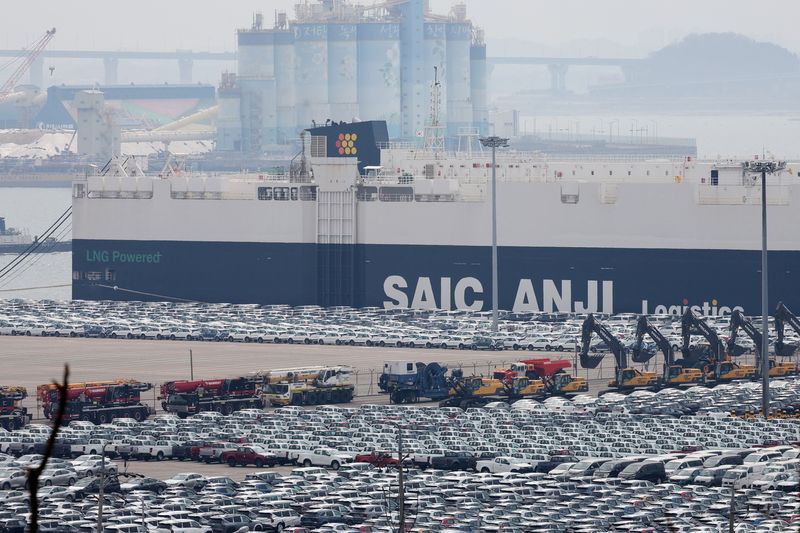
By Jihoon Lee and Heekyong Yang
SEOUL (Reuters) -South Korea on Wednesday announced emergency support measures for its auto sector, seeking to reduce the blow of U.S. President Donald Trump’s tariffs on a sector that has seen years of sharply rising exports to the United States.
The measures include financial support for the auto industry as well as tax cuts and subsidies to boost domestic demand, while the government also vowed efforts to negotiate with the U.S. and help expand markets.
Trump has announced a 25% tariff on imported cars and light trucks starting on Thursday. Manufacturers are expected to bear some of the tariff costs in the first year, but will eventually alter production and possibly cease importing certain low-volume models into the U.S. market.
"Given the (lower) proportion of South Korean automakers’ local production in the United States, our industry is comparably at a disadvantage," the government said in a statement.
The tariff was expected to cause "significant" damage to South Korean automakers and auto parts manufacturers, though it was difficult to come up with numerical estimates at the moment, the government said.
To help prevent any liquidity issues, the government will raise policy financing support for the auto industry to 15 trillion won ($10.18 billion) in 2025 from the 13 trillion won previously planned, according to the statement.
The government will lower taxes on automobile purchases to 3.5% from the current 5% until June 2025 and raise electric-vehicle subsidies to 30%-80% of price discounts from the current 20-40% with the period extended by six months to the end of this year.
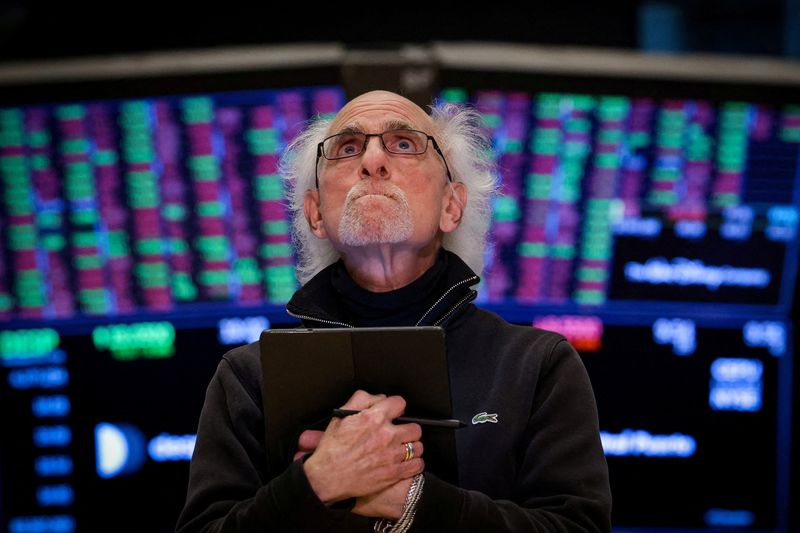
U.S. stock index futures dropped Tuesday evening after Wall Street ended sharply lower with the S&P 500 closing below 5,000, as tariffs announced by President Donald Trump were set to take effect at midnight.
President Trump signed an executive order on Tuesday to increase reciprocal tariffs on China to 84%, from 34% earlier announced on April 2. This brings total duties on China to 104%, with 20% tariffs already in place.
S&P 500 Futures dropped 1.8% to 4,929.75 points, while Nasdaq 100 Futures declined 2.2% to 16,868.50 points by 20:25 ET (00:25 GMT). Dow Jones Futures lost 1.4% to 37,325.0 points.
S&P 500 falls below 5,000 as Trump escalates trade war with China
In regular trading, Wall Street experienced significant volatility, culminating in notable declines across major indices.
The S&P 500 closed at 4,982.77, down 1.6%, marking its first close below the 5,000 threshold in nearly a year.
The Dow Jones Industrial Average also fell by 0.8%, while the NASDAQ Composite slipped 2.2%. This downturn was largely attributed to escalating trade tensions as the Trump administration prepared to implement substantial tariffs on Chinese imports.
The administration confirmed plans to impose a cumulative 104% tariff on Chinese goods, set to take effect at midnight. The tariffs include an additional 50% levy on Chinese goods, supplementing an existing 34% reciprocal tariff.
Before this, China had vowed to "fight to the end" if Trump moved ahead with his new tariff threats, further heightening investor anxiety and market instability.
Investor sentiment was initially buoyed by comments from Treasury Secretary Scott Bessent, suggesting openness to negotiations.
However, optimism faded after U.S. Trade Representative Jamieson Greer confirmed that no exemptions would be granted for products or companies affected by the new tariffs. This firm stance diminished hopes for a diplomatic resolution and contributed to the market’s reversal.
Tech slides: Tesla, Apple slump 5%
The technology sector was particularly impacted, with Apple Inc (NASDAQ:AAPL) shares dropping 4.8% to over an 11-month low.
Tesla Inc (NASDAQ:TSLA) shares slumped 5%, while market darling NVIDIA (NASDAQ:NVDA) closed 1.4% lower.
Amazon (NASDAQ:AMZN) and Meta Platforms Inc (NASDAQ:META) also suffered losses.
Broadcom Inc (NASDAQ:AVGO) closed 1.4% higher, reversing tariff losses, after it announced a new share buyback program of up to $10 billion, set to run through the end of the year.
Looking ahead, investors await consumer price index report due on Thursday for guidance on the country’s inflation outlook.
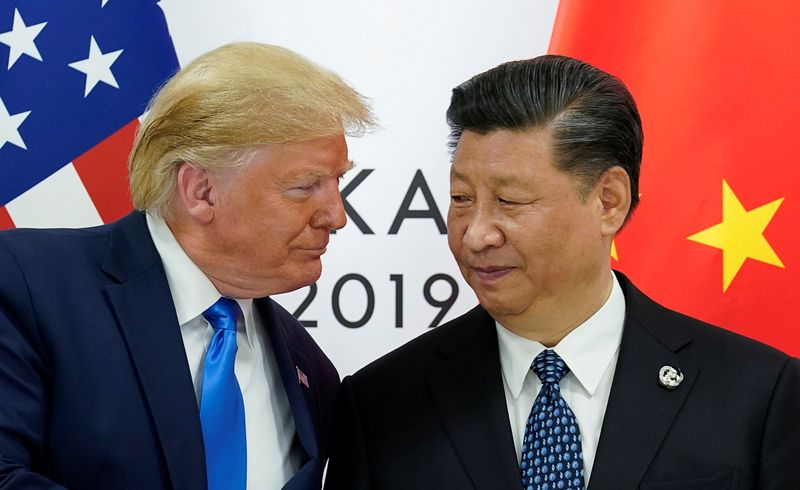
U.S. President Donald Trump on Tuesday evening signed an executive order imposing an additional 50% tariff on China, marking an escalation in an increasingly dire trade war with Beijing.
Trump signed an order increasing his reciprocal tariffs against China to 84% from a prior rate of 34%, effective from 00:01 ET (04:01 GMT), April 9.
The order comes just a day after Trump threatened to hike tariffs against China if Beijing did not withdraw its decision to impose 34% retaliatory tariffs against the U.S..
Trump’s order now brings the total tariff rate against China to 104%, well above the 60% threatened by Trump when he was campaigning for the presidency. The 84% reciprocal tariff is in addition to a 20% tariff imposed in March.
Trump’s order also increased tariffs on De Minimis goods- a class of low-value goods from China and Hong Kong that were initially exempt from any U.S. import tariffs.
China had signaled that it had no intent of backing down, with officials vowing to “fight to the end” against the U.S.. China is also expected to ramp up its stimulus measures to offset the economic headwinds from Trump’s tariffs.
Trump’s reciprocal tariffs on other major economies are also set to take effect from April 9. The U.S. President claims he is seeking to rectify allegedly “unfair” trading practices that disadvantage the U.S., and is also looking to increase U.S. manufacturing and industrial output with his tariffs.
While U.S. officials claimed that they had begun or planned talks with at least 50 countries over new trade agreements, Trump has signaled little intent to begin immediate negotiations with China.
Growing fears of a global trade war, along with disruptions for U.S. companies from Trump’s tariffs sparked steep declines in financial markets in recent sessions.

Goldman Sachs forecasts a decline in Brent and WTI oil prices to $62 and $58 per barrel, respectively, by December 2025, and further to $55 and $51 by December 2026.
These projections are based on two key assumptions: that the U.S. economy will avoid a recession due to significant tariff reductions set to commence on April 9, and that OPEC+ will moderately increase supply with two increments of 130-140kb each in June and July.
The investment bank also outlined scenarios where oil prices could deviate from these projections.
In the event of a sharp reversal in tariff policy, oil prices could exceed Goldman Sachs’ current estimates.
On the other hand, if the U.S. enters a typical recession while adhering to their OPEC baseline, Brent oil could fall to $58 per barrel by December 2025 and to $50 by the following year.
In a scenario where global GDP growth sees a slowdown, Goldman Sachs estimates Brent could drop to $54 per barrel by December 2025 and to $45 by December 2026.
“We estimate a similar price path assuming our GDP baseline and a full unwind of the 2.2mb/d of OPEC+ cuts,” strategists led by Yulia Zhestkova Grigsby wrote in a note.
In a more extreme scenario, combining a global GDP downturn with a total unwinding of OPEC+ cuts, which would in turn discipline non-OPEC supply, strategists project that Brent oil could fall to just under $40 per barrel in late 2026.
However, the strategists note that oil prices are “unlikely to fall well below $40/bbl on a sustained basis,” citing two reasons.
Firstly, U.S. shale production is likely to provide a stronger price floor at lower levels, and secondly, any potential U.S. recession in 2025 is not anticipated to be severe, partly due to the absence of significant financial imbalances in the private sector, strategists said.
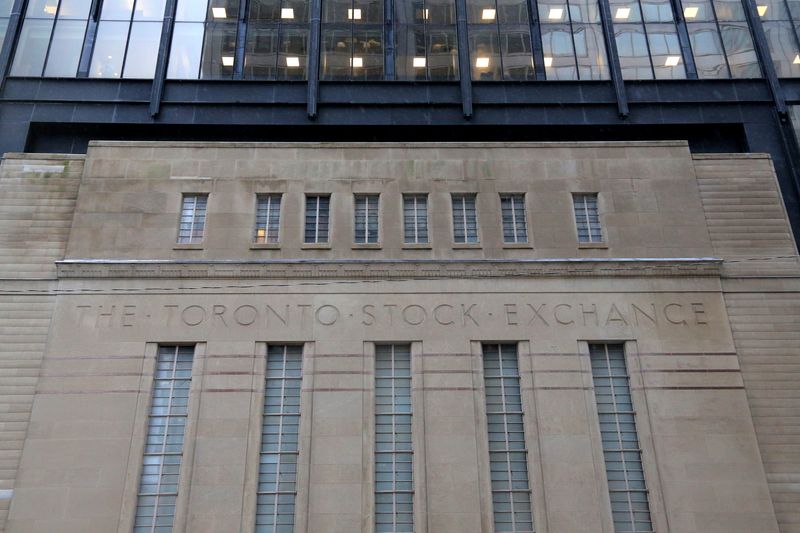
By Fergal Smith
(Reuters) -Canada’s main stock index fell on Monday to a seven-month low, including declines for energy and financial shares, as a widening trade war threatened to derail the global economy and despite the prospect of negotiations that could lead to deals.
Toronto Stock Exchange’s S&P/TSX composite index ended down 334.01 points, or 1.4%, at 22,859.46, adding to steep declines on Thursday and Friday and posting its lowest closing level since September 6.
The index has fallen 11.4% since posting a record closing high on January 30. That’s a magnitude that puts it in correction territory but a smaller pullback than for some other major indexes, such as the S&P 500.
U.S. President Donald Trump said he was not looking at a pause on tariffs to allow for negotiations with trading partners but said he would talk to China, Japan and other countries about the duties.
"It looks like deals are going to be made, which is a positive, yet the market is not sure," said Allan Small, senior investment advisor of the Allan Small Financial Group with iA Private Wealth.
Energy was down 2% as the price of oil extended its recent declines, settling 2.1% lower at $60.70 a barrel, on worries that tariffs could push economies around the world into recession.
Heavily weighted financials also lost 2%, with Great-West Lifeco Inc (TSX:GWO) down 5.1%.
Consumer staples ended 2.8% lower. Shares of Loblaw Companies Ltd (TSX:L) declined 3.2%, extending their pullback from a record high on Thursday.
The probability of a U.S. recession has risen significantly thanks to Trump’s tariffs and that will have a major negative effect on the Canadian economy, Prime Minister Mark Carney said.
Canadian firms and consumers see a sharply higher chance of recession over the coming year as U.S. tariffs and possible retaliation fuel widespread uncertainty, the Bank of Canada said.
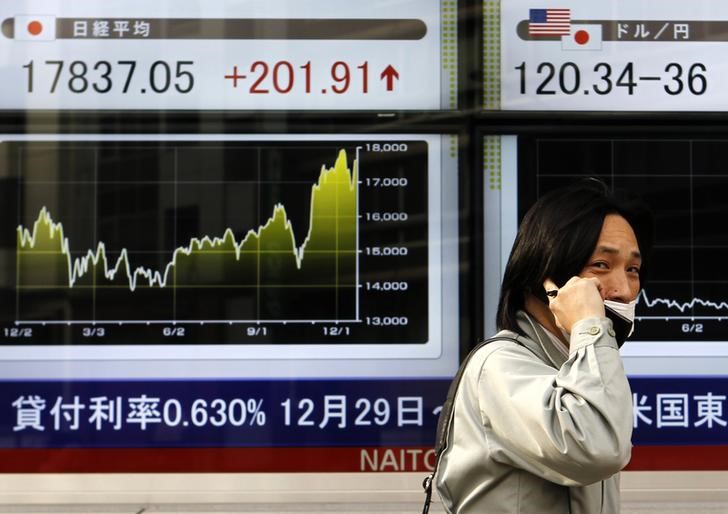
Asian stock markets staged a modest recovery on Tuesday, rebounding from the previous session’s steep losses driven by escalating global trade tensions.
Most regional stock indices saw sharp gains helped by an overnight bounce back in U.S. technology stocks, while some dip-buyers emerged after three days of sharp declines.
Major U.S stock indexes closed slightly lower on Monday, while the tech-heavy Nasdaq inched up. Futures tied to these benchmark indexes jumped in Asian trading on Tuesday.
However, investors were cautious due to an escalating global trade. U.S. President Donald Trump on Monday threatened more tariffs on China, which faced retaliatory vows from Beijing.
Japan stocks surge on tech boost, weaker yen
Japan’s Nikkei 225 index led the resurgence, soaring nearly 7%, after heavy declines in the previous three sessions.
The broader TOPIX index also experienced significant gains, rising more than 7%.
The rebound was bolstered by a weakening yen and a surge in technology stocks.
Chip-related companies such as Tokyo Electron (TYO:8035) and Advantest Corp. (TYO:6857) saw their shares jump over 10% and 12%, respectively. SoftBank Group Corp. (TYO:9984) also climbed over 12%, contributing to the market’s recovery.
The yen’s reversal from its recent gains alleviated pressure on Japanese exporters.
Trump threatens extra tariffs on China; Beijing vows to retaliate
President Trump further escalated tensions with Beijing on Monday by threatening to impose an additional 50% tariff on Chinese goods if China does not reverse its recent 34% tariff hike on American imports by April 8.
China responded swiftly, with its Ministry of Commerce saying it would "fight to the end" and implement countermeasures if the U.S. follows through.
China already faces a combined 54% tariffs, with the recent 34% reciprocal duties announced on April 2.
UBS estimates that if tariffs stay in place, China’s 2025 export growth could fall by 5 percentage points and GDP growth by 1.5 points. Revenues for A-share non-financial firms may drop by 2.4 points, with net profit growth slowing by 6 points due to weaker margins.
However, Chinese shares were higher on Tuesday after several Chinese state-owned firms pledged to boost equity investments, as Beijing moved to shore up markets rattled by U.S. tariff tensions.
China’s central bank said Tuesday it supported state-owned Central Huijin Investment in boosting its holdings of index funds and will offer re-lending support if needed to help stabilize markets.
The blue-chip Shanghai Shenzhen CSI 300 index rose 0.5%, while the Shanghai Composite gained 0.7%.
Hong Kong’s Hang Seng jumped as much as 3%, after plunging more than 15% in the previous session.
Australia shares rise 2%, Singapore stocks decline
Australia’s S&P/ASX 200 rose nearly 2%, rebounding from a one-year low reached on Monday.
Futures for India’s Nifty 50 indicated a sharp rise at open on Tuesday.
South Korea’s KOSPI rose 1%.
Bucking the regional trend, Singapore’s Straits Times Index extended declines, dropping more than 2%.
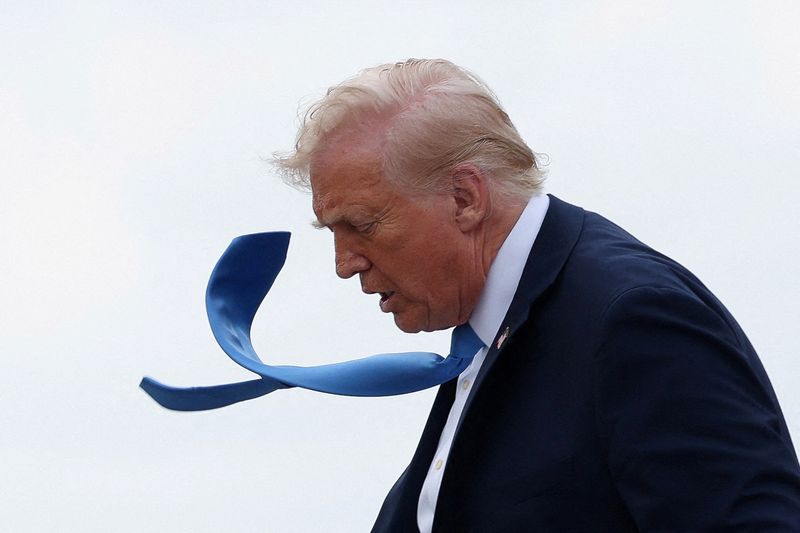
Monday’s declaration by U.S. President Donald Trump indicates a further escalation in the trade tensions between the United States and China. Trump, in a post on Truth Social media, has stated that the United States will impose an additional 50% tariff on Chinese goods if China does not rescind its recent 34% tariff hike by April 8, 2025. This ultimatum follows China’s retaliatory tariffs and other trade practices that Trump has labeled as abusive.
The new tariff escalation from Trump comes despite markets around the world being rocked by Trump’s reciprocal tarrif announcement last Wednesday. The S&P 500 lost over 10% last week since the announcement and is down another 1.8% today, accelerating losses following the social media post.
In his message, President Trump criticized China for its imposition of a 34% retaliatory tariff, which he views as an addition to its "already record-setting tariffs, non-monetary tariffs, illegal subsidization of companies, and massive long-term currency manipulation." He emphasized that any country retaliating against the U.S. with additional tariffs would face immediate and substantially higher tariffs from the U.S. in response.
Trump’s post clarified the consequences for China if it fails to withdraw the tariff increase. He stated that the new U.S. tariffs would be effective from April 9th. In addition to the tariff threat, Trump also announced that all discussions with China regarding their requested meetings would be terminated if they do not comply with the U.S. demands.
The President’s message comes in the wake of what he describes as China’s long-term tariff abuse of the U.S. He has previously warned that retaliation by any country with additional tariffs would be met with a significant response from the U.S. In his post, he also mentioned that the United States would begin immediate negotiations with other countries that have sought meetings, signaling a shift in diplomatic engagement away from China.
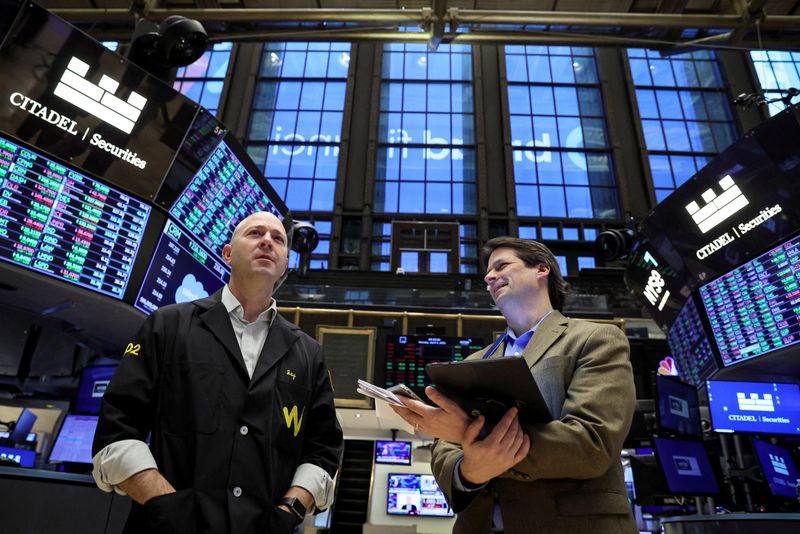
S&P 500 stocks cut some losses Monday, but ultimately ended lower after swinging widely during the session amid ongoing speculation on whether President Donald Trump will offer countries a path toward negotiating reprieves on tariffs.
At 4:00 p.m. ET, the Dow Jones Industrial Average dropped 349 points, or 1.2%, the S&P 500 index gained 0.2%, while the NASDAQ Composite added 0.04%.
The benchmark indices had opened sharply lower Monday, continuing the selloff seen at the end of last week, which had seen the broad-based S&P 500 index tumble over 10%, erasing nearly $5 trillion in market value, marking its most significant two-day loss since March 2020, the onset of the COVID-19 pandemic.
Trump reiterates no pause on tariffs; threatens to raise China tariffs following retaliation; talks to start with Japan
In a press briefing on Monday, Trump reiterated that the United States wasn’t considering pausing the reciprocal tariffs that have wrecked havoc on markets.
Earlier in the session, stock saw a brief reprieve on unconfirmed reports that U.S. President Donald Trump was considering pausing his sweeping trade tariffs for 90 days on all countries except China. The White House later debunked this as "fake news", but the short-term jump in stocks illustrates the jitteriness of the market after two brutal days of selling.
Trump, in a post on Truth Social media shortly after 11 AM ET, stated that the United States will impose an additional 50% tariff on Chinese goods if China does not rescind its recent 34% tariff hike by April 8, 2025. This ultimatum follows China’s retaliatory tariffs and other trade practices that Trump has labeled as abusive.

